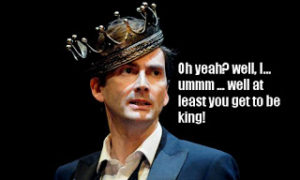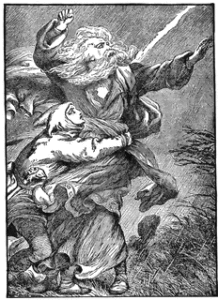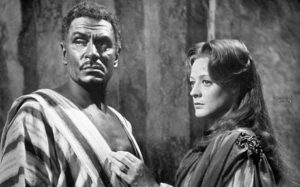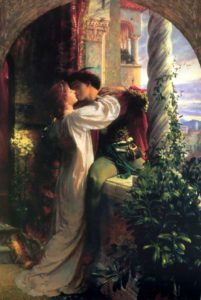 Bear with me for a moment.
Bear with me for a moment.
I have a very vivid memory of studying Othello in high school, some thirty plus years ago, and getting to this pretty famous passage, where Othello explains how he won Desdemona’s heart:
My story being done,
She gave me for my pains a world of sighs:
She swore, in faith, twas strange, ’twas passing strange,
‘Twas pitiful, ’twas wondrous pitiful:
She wish’d she had not heard it, yet she wish’d
That heaven had made her such a man: she thank’d me,
And bade me, if I had a friend that loved her,
I should but teach him how to tell my story.
And that would woo her. Upon this hint I spake:
She loved me for the dangers I had pass’d,
And I loved her that she did pity them.
This only is the witchcraft I have used:
Here comes the lady; let her witness it.
The problem is that I remember reading, “that she did not pity them.” I couldn’t tell you how or why, it would have been one of those things where teachers photocopy an excerpt out of a book into a few pages and staple them together to pass out to the class. Additionally it would have been my first exposure to Othello, and I was maybe fifteen years old? So I wasn’t exactly looking to document the citation at the time.
Later during that same class (not literally within that hour – days or weeks later while still taking that same class with that same teacher) I remember seeing the passage again, seeing it as “did pity them”, and immediately seeing the discrepancy. But when I went back to locate the documentation for “did not pity them”, I never found it.
I never really gave it much thought over the years. But now I’ve got access to a certain amount of resources I didn’t have then. I’ve got professional Shakespeare researchers who can do things like check to see if Shakespeare ever wrote it down that way, or if any editors chose to make that alteration.
So far we haven’t come up with any. And yet — Googling for the phrase “and I loved her that she did not pity them” turns up some results. Where’d those come from? I can’t decide if I find it amusing or upsetting that most of the hits come from quizlets and essay sites.
One of the hits is from a 2015 novel called Vienna by William S. Kirby. I’ve even gone so far as to write to the man, to see if he remembers why he thinks that’s the line. I’ll have to update this post if I ever get a response.
I’m mostly documenting this here in case there’s other people out there that have a vague memory of this, as I do. Bardfilm suggested that “an ill-prepared edition” could have made it into use by the schools at some point. If that’s the case, which certainly seems reasonable if we assume that my memory is not faulty. Maybe some day we’ll know for sure!
 For some reason on the ride in to work today I was thinking about Sir Derek Jacobi. That’s not even a “the reason is not important,” that’s “No, seriously, I honestly can’t remember.” I do remember thinking, if I had the chance to interview the man, what would I even say? I hate that fake, “I’m such a big fan I’ve seen all your movies you’ve changed my life” stuff. Other than a clip of his Hamlet I’m not sure how much else I could name.
For some reason on the ride in to work today I was thinking about Sir Derek Jacobi. That’s not even a “the reason is not important,” that’s “No, seriously, I honestly can’t remember.” I do remember thinking, if I had the chance to interview the man, what would I even say? I hate that fake, “I’m such a big fan I’ve seen all your movies you’ve changed my life” stuff. Other than a clip of his Hamlet I’m not sure how much else I could name.
 movie that’s coming out and said, “Somebody makes us one of those!” Hey, that’s how we got Antz before A Bug’s Life, if you remember. If the movie studios want to compete over Shakespeare adaptations as well as animated features, I’m totally ok with that.
movie that’s coming out and said, “Somebody makes us one of those!” Hey, that’s how we got Antz before A Bug’s Life, if you remember. If the movie studios want to compete over Shakespeare adaptations as well as animated features, I’m totally ok with that. Bear with me for a moment.
Bear with me for a moment. Our pal
Our pal